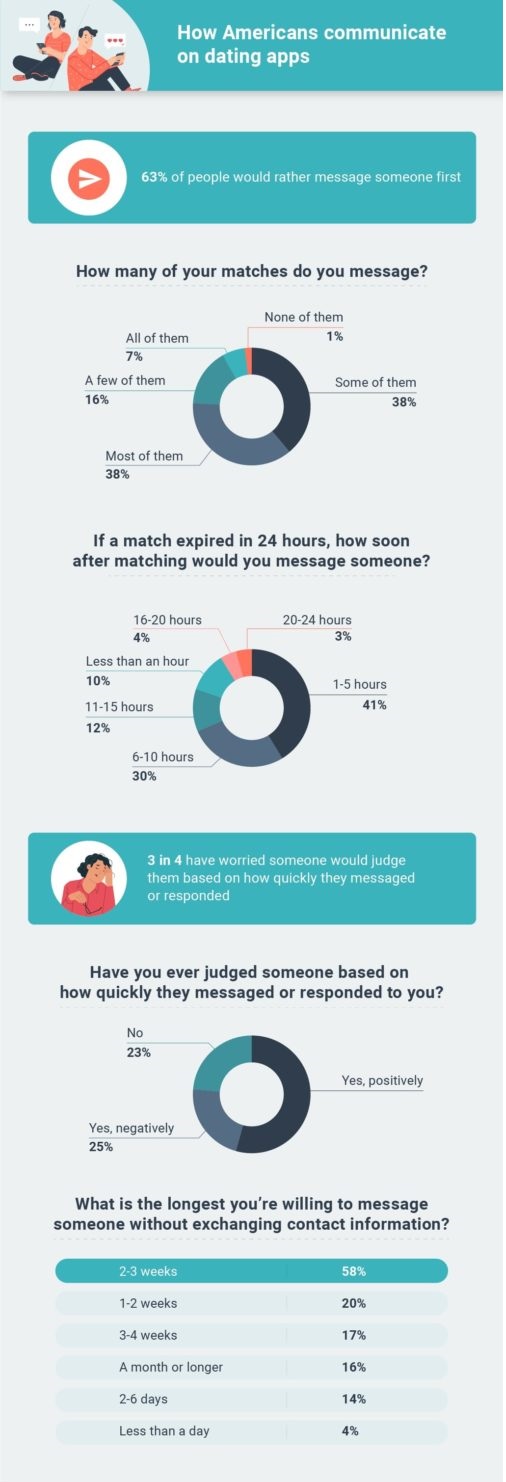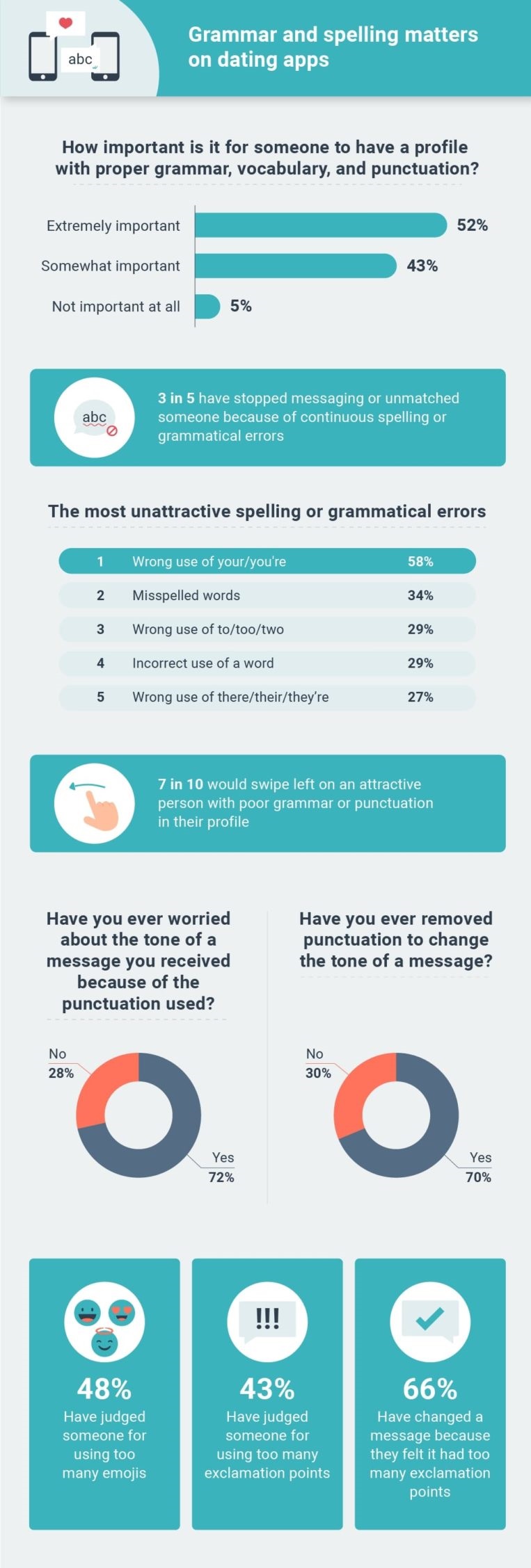We conducted a survey of almost 2,000 dating app users to explore the ideal timing for contacting a match, strategies for composing effective messages, and the significance of grammar in online dating.

What is your English level?
Find out your A1 A2 B1 B2 C1 C2 level of English with our quick, free online test.
Navigating the dating world is complex, and even with numerous prospects available through dating apps, finding a compatible partner can be a challenge.
In 2021, approximately 30.4 million Americans used dating apps, and this number is expected to increase by 5 million over the next five years. With the abundance of swipes, initial messages, and conversations taking place, we aimed to gain insights into contemporary dating app communication and identify successful techniques. To do so, we conducted a survey of nearly 2,000 individuals, all of whom had utilized dating apps within the past five years.
Key takeaways
- A significant 68% of individuals opt to swipe left when encountering profiles of attractive people with subpar grammar or punctuation.
- Seventy percent of respondents believe that it’s conceivable to develop romantic feelings just through messaging on a dating app, and three-quarters have experienced a committed relationship with someone they initially met on such an app.
- Fifteen percent of users log into their dating apps between 10 and 14 times daily.
How Americans use dating apps
When it comes to online matchmaking, choices are a key factor for Americans, and this applies not only to potential partners. Among those currently using dating apps, one in five individuals is simultaneously using five or more apps, and 80% of app users opt for paid premium tiers. The apps that currently dominate the market include:
- Tinder: 58%
- Bumble: 34%
- Hinge: 29%
- OkCupid: 29%
- Coffee Meets Bagel: 27%
App users aren’t merely present on these platforms; they are highly engaged. Approximately 20% of users participated in a minimum of 10 conversations, and 1 in 4 users check their apps between 5 to 9 times each day. Additionally, 15% of users check their apps as frequently as 10 to 14 times a day.

For a significant portion of users, using dating apps constitutes a substantial portion of their daily routine. Specifically, 40% of users allocate a minimum of 2 hours to dating apps daily, while 15% confess to dedicating at least 3 hours each day to these platforms.
Despite the apparent effort involved, the commitment frequently results in success, with nearly 75% of users having experienced a committed relationship with someone they initially met on a dating app.
Are you C1 Advanced English?
Get your C1 Advanced English certificate now!
✓ Add your certificate to your resume
⭐ ⭐ ⭐ ⭐ ⭐
How we communicate on dating apps
Is it straightforward for individuals to establish genuine connections amidst the multitude of conversations happening on dating apps? Absolutely, and the process is more straightforward than one might think.
The majority of users, 70%, find it easy or very easy to engage in meaningful conversations on all apps. Moreover, nearly 75% believe that it’s feasible to develop feelings of love based solely on interactions within an app. While this is indeed heartening, what exactly constitutes a meaningful conversation?

The initial interaction holds significant importance for many users. More than 60% of them express a preference for initiating the first message, and nearly 40% consider a good opening line to be essential. However, there’s no need for grandeur or spectacle. The most favored types of opening lines are as follows:
- Something that shows you have common interests.
- Something that has to do with someone’s profile.
- A simple introduction (e.g., “Hi” or “Hi, I’m ____”).
As for your response when you receive a message, there’s some interesting dynamics at play. A significant portion of users (75%) express concerns about being judged based on how quickly they reply. However, it’s worth noting that 42% of respondents actually appreciate receiving speedy responses. So, if you’re inclined to reply promptly, rest assured that many people welcome this approach.
Do language barriers and proper grammar matter on dating apps?
Among those who matched with non-English speakers, 57% faced language barriers, but 64% adjusted their communication style to connect with their match, and 70% continued building the connection. The availability of local and online language tutors makes learning a new language a viable option.
A language barrier may not necessarily end a potential connection, but poor grammar can.
Precise spelling, punctuation, and grammar hold significant importance for 95% of survey respondents. Furthermore, 35% consider a lack of proper education a negative aspect. In fact, 68% of users reject individuals with attractive profiles if they exhibit poor grammar or punctuation.
Moreover, 62% of users cease responding to messages when confronted with spelling and grammar problems. This data emphasizes the crucial role of enhancing one’s grammar for success in online dating.

Men and women, when identifying attractive individuals with poor grammar, display similar behaviors. Many of them will outright reject their matches based on this criterion. While a higher proportion of women (40%) assess their matches for poor grammar and punctuation, nearly a third of men also do so.
An overwhelming 75% of respondents express concern about how punctuation can affect the message’s tone. The precise use of periods and capitalization can convey a wide range of emotions, making sentence structure crucial. In fact, 70% of users have deliberately omitted punctuation to create a lighter message tone.
One of the most notable grammatical issues is related to common spelling errors, particularly the misuse of “your/you’re.” If you struggle with words like “its/it’s,” “there/their,” and “your/you’re,” consider seeking online English grammar tutoring to elevate your chances in the realm of love.
What makes a perfect message?
Certainly, we understand that grammar is crucial, but what other elements contribute to an effective message? Apart from an ideal opening line and grammatical correctness, the message’s style and timing also hold significance.
A higher percentage of respondents (55%) favor exchanging one long message for communication. Over 25% dispatch their first message within minutes of matching, and a similar proportion prefers to respond rapidly. Nevertheless, 25% believe that waiting a couple of hours before responding is more suitable. In summary, timing and style are integral to message success.

The biggest red flags on dating apps
When conversations become more serious, proper etiquette comes into play.
To begin with, 97% of all participants emphasize the significance of having a comprehensive profile. However, even a comprehensive profile should adhere to certain guidelines. According to the survey, it’s advisable to avoid snarky comments and pop culture references in your profile, as these phrases were the most prominent warning signs:
- “Impress me”
- “Work hard, play hard”
- “No drama”
Additionally, 25% of respondents disapprove of movie quotes and references to entertainment in a profile. Therefore, it might be a good idea to remove your beloved quotes from shows like “The Office” or the “Harry Potter” films.
The subjects you choose to discuss are crucial as well. In the initial stages, it’s best to avoid talking about money, sex, work, religion, and COVID-19.
For all age groups except Gen Z, discussions about money are the most discouraged. Meanwhile, Gen Z finds discussions about religion to be the most sensitive. These topics are undoubtedly important, but they are generally considered inappropriate for early messaging.
How safe do we feel on dating apps?
Ensuring a sense of safety is crucial when communicating with someone you haven’t met. Regrettably, over 60% of survey respondents have experienced feelings of insecurity at least once while using a dating app. This concern is not dependent on one’s gender or sex, as both men and women are nearly equally likely to report having felt unsafe, with 62% and 67% respectively.

So, how do users react when they encounter an uncomfortable situation with a match? For over 40%, their course of action involves reporting the issue to the app provider. Another 38% simply discontinue communication with the other individual. However, in the digital realm, these measures don’t always provide a solution.
Remarkably, more than 61% of users have experienced contact from someone on a different platform, even after expressing disinterest. Additionally, over 3 in 5 users receive unsolicited explicit messages and images, a scenario that spans across gender lines, as 65% of men and 67% of women have reported receiving such messages.
Conclusion
Discovering love in the digital age might seem more accessible than ever before. Through a straightforward app, you can connect with millions from the comfort of your own home. Nevertheless, dating apps come with their own set of guidelines and constraints.
In a text-based environment, your proficiency in grammar and spelling holds significant weight. Without a fundamental understanding of written communication, your chances of finding a match are diminished. The importance of creating compelling profiles cannot be understated either. When people initially encounter your pictures and descriptions, their first impressions are crucial.
After securing a match, keep your approach straightforward. Avoid diving into weighty topics such as finances or religion. Instead, focus on shared hobbies and interests as a starting point and build from there. Although online matchmaking facilitates numerous concurrent conversations, the quality of your interactions remains a critical factor. As has always been the case, initial conversations can either make or break the potential for any relationship.
What is your English level?
Find out your A1 A2 B1 B2 C1 C2 level of English with our quick, free online test.





